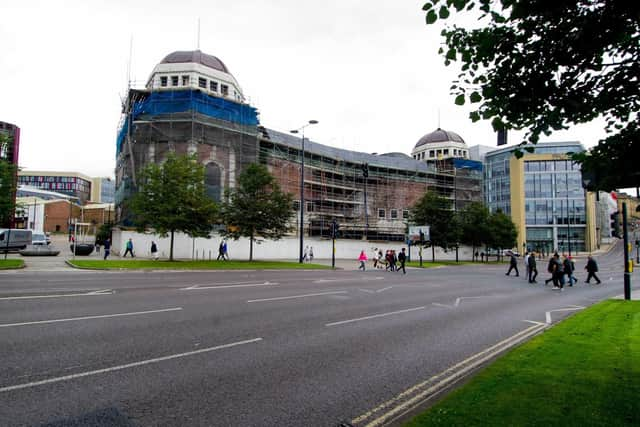Why 'progress' is still important in Bradford's old motto - David Alcock
These words – the motto of Bradford Council - proudly adorn the scaffolding of its old Odeon building, soon to be reborn as a huge indoor music and entertainment venue, Bradford Live.
The words seem to hark from a different era. Might they have been written in the Victorian age - boom times for ‘wool city’? Or were they penned in Edwardian times, when the city hosted a Great Exhibition in Lister Park, attracting 2.4 million guests, and whose star attraction was a vast Industrial Hall?
Advertisement
Hide AdAdvertisement
Hide AdNo – they were written as recently as 1976. The motto summarises what Bradford stood for then, and it was retained when the crest was updated just five years ago, when the council stated that it “still chimes with our priorities”. But in an era of culture-led regeneration and the information economy, are the concepts of progress, industry and humanity still relevant, or are they just a hangover from a more gung-ho past?


Whilst a more competitive global environment, a move towards synthetic materials, and a change in government priorities have led to deindustrialisation, Bradford hosts the national and regional headquarters of several large companies in both the manufacturing and service sector, so ‘industry’ still earns its place in the motto. Moreover, the arts industry has been given a boost by the awarding of ‘2025 City of Culture’ status to Bradford, and the term ‘industry’ sums up both the heritage and grit which many see as characterising the city.
Similarly, few would argue against the place of ‘humanity’ in the motto. Bradford is a diverse place which has welcomed outsiders throughout its history, and especially so since the 1950s.
This has been cemented by its status as a City of Sanctuary 2010, in recognition of the role that it has played in providing a place of safety for people who have fled dangerous circumstances. Whilst the city, like many dynamic places, has experienced challenges, its diversity is also a source of its strength and vibrancy. Moreover, with a quarter of its population being under 18, and with an average age of 37, recognising and investing in Bradford’s humanity is crucial.
That leaves ‘progress’.
Advertisement
Hide AdAdvertisement
Hide AdFrom around the sixteenth century until just a few decades ago, the concept of ‘progress’ was rarely questioned in the western world, outside of the realms of certain branches of philosophy and literature. Victorian Britons had a particular fondness for the idea that there was an inexorable drive towards ever advancing material, social and moral conditions, and that there was great pride to be had in promoting its cause.
Ideas of progress went hand in hand with those of ‘civilisation’, and, driven by the Industrial Revolution and a widespread increase in living standards during the nineteenth and twentieth century, it is no surprise that the authorities in Bradford embraced the term in the 1970s and continue to do so today.
However, progress does, of course, have its dark side. Domestically, the Industrial Revolution drew many millions of people into cities across Britain, and whilst conditions eventually improved, squalor and pollution led to disease and premature death for many. Notions of progress would have rung hollow to those working long hours in ‘dark satanic mills’, let alone the men, women and children who toiled underground in the early days of mining, as I was reminded of in a recent trip to the Welsh museum of mining at Big Pit, Blaenavon. Rural life was no bucolic idyll, but for many, the move to the city must have seemed like a step backwards rather than a step forwards.
Environmentally, not only did ‘progress’ turn many parts of cities into dirty, smog-ridden, Dickensian hellholes, but its voracious appetite for raw materials led to the denudation of forests, the loss of biodiversity, and the industrialisation of farming. Fossil fuel-led economic development has resulted in climate change, and colonisation, enslavement, and the oppression of indigenous peoples and cultures can also be linked to western notions of ‘progress’. Such concerns reverberate today, and the very concept has fallen into disuse.
Advertisement
Hide AdAdvertisement
Hide AdSo, in this era of recognising historical wrongdoings, should we campaign to expunge the word ‘progress’ from the council’s motto, and indeed from wider conversations in the city, the county, and beyond?
No. Instead, we should rally around a reformed notion of progress. Yes, we must recognise that many ‘steps forward’ have hidden costs which may not fully manifest themselves for decades.
And yes, the framework of ‘sustainable development’, as adopted by the United Nations, is useful, but does it stir up the passions needed to meet the challenges of the future with energy, hope, and action?
Believing in ‘progress’ and the capacity of humankind to improve our lot has helped most of humankind to become wealthier, healthier, more educated, and, believe it or not, more peaceful, over recent centuries. But whilst many of us in more affluent countries have met our material needs, many both at home and abroad have not, and we shouldn’t give up on ideas of progress whilst such inequalities remain.
Advertisement
Hide AdAdvertisement
Hide AdHumans thrive on having goals to aim for, and starting conversations about what our shared ideas of progress might involve will foster an atmosphere in which we can share such goals and work towards meeting them.
David Alcock is a geography teacher at Bradford Grammar School and founder of Hopeful Education.